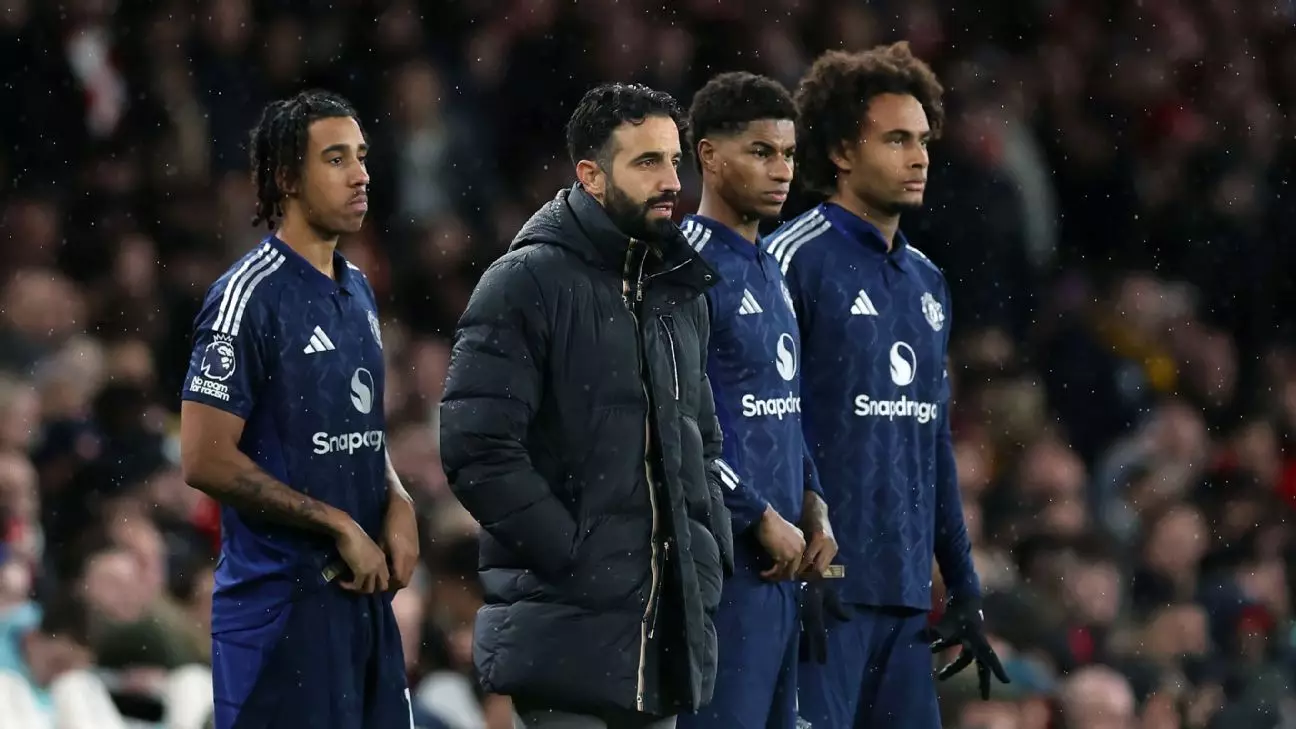Ruben Amorim’s recent tenure at Manchester United has already presented him with significant hurdles, as exemplified by his first defeat in charge during a challenging match against Arsenal. The 2-0 loss underscored the stark reality that with the current squad experiencing multiple injury setbacks, Amorim faces the daunting task of rebuilding morale and performance. Both Jurriën Timber and William Saliba secured the Gunners’ victory with second-half goals that came from set pieces, forcing Amorim to grapple not only with the tactical aspects of the game but also with his players’ fitness levels.
In his post-match remarks, Amorim candidly addressed the ongoing struggle with player fitness, emphasizing how injury limitations hinder his preferred tactical approach. Key players like Harry Maguire, Tyrell Malacia, and Mason Mount were restricted to playing less than an hour, symbolizing the broader issue of insufficient match readiness in his squad. New recruit Leny Yoro, returning from a serious foot injury, made his debut under these trying conditions, highlighting the pressure on Amorim to manage players with “time limits” effectively.
“It’s not because I like to change all the time,” Amorim stated, illustrating the necessity to adapt his strategies according to the fitness scenarios presented. Assembling an optimized lineup with reduced resources fundamentally alters match dynamics. These restrictions push him to adopt a more cautious methodology, compromising the aggressive pressing game he might otherwise implement.
Amorim’s situation shines a spotlight on the critical need for squad depth at elite clubs such as Manchester United, especially in the highly competitive Premier League. Inconsistent performance may stem from an uneven lineup, where the absence of certain key figures forces coaches to stretch resources thin. His comments indicate a concerted effort to ensure all players are fit in hopes of establishing a more cohesive unit—a challenge intensified by the current injury crisis.
The mention of evaluating players’ fitness for upcoming games reflects Amorim’s thorough approach to player management. He iterated that the players at risk of injuries would not participate in future matches, a sensible precaution that demonstrates his long-term vision for player health and performance.
Despite the disappointing result at the Emirates, Amorim remains optimistic, indicating a willingness to extract lessons from adversity. His evaluation transcends mere scorelines; he aims to catalyze growth and improvement, focusing on performance indicators rather than results alone. “I make the evaluation of the game regardless of the result,” he mentioned, reinforcing a positive narrative around player development and resilience.
He acknowledged the discomfort experienced by players during the match, signaling a nuanced understanding of game momentum and psychology. Amorim’s awareness of shifting game dynamics indicates that, despite the loss, he perceives valuable learning experiences even in times of hardship.
In the realm of management, building a strong rapport with players can be just as important as strategizing for games. Amorim’s commitment to Luke Shaw’s recovery epitomizes this principle. Following Shaw’s recent injury setback, Amorim pledged to provide the defender with ample time for recovery, showcasing a managerial ethos centered on player welfare. His acknowledgment of Shaw’s diligence in rehabilitation efforts highlights a supportive coaching environment, fundamental for fostering athlete longevity.
“He’s a top, top player and we need him,” Amorim asserted, underlining Shaw’s value to the team and implying that healing takes precedence over immediate participation.
Ruben Amorim’s initial phase at Manchester United is characterized by both adversity and opportunities for growth. The tactical struggles amid injury limitations pose significant challenges, yet they offer insights into his adaptive strategies and unwavering commitment to player welfare. As he works toward reintegrating injured players and establishing team cohesion, the lessons learned during moments of difficulty may form the cornerstone of future successes. The road ahead may be fraught with obstacles, yet with resilience, clear communication, and strategic foresight, Amorim’s tenure could herald a new era for Manchester United.


Leave a Reply